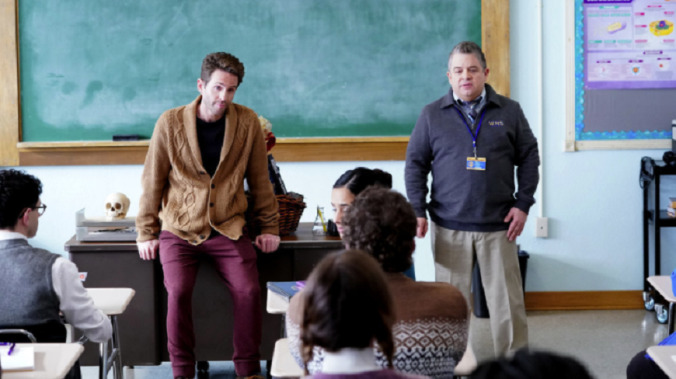A.P. Bio seems unsure of what to do with its Peacock resurrection

The premise of Mike O’Brien’s A.P. Bio was probably always destined for a limited shelf life. It seems inevitable that the former NBC series would eventually settle into one of two realities: Either disgraced Harvard philosophy professor Jack Griffin (Glenn Howerton) would escape his personal hell of (not) teaching high school biology in Toledo, Ohio. Or else he’d finally come to terms with the fact that a life of eating things with cheese melted on them in the American Midwest isn’t really all that bad. Either way, series over, right?
A.P. Bio seemed determined to resolve this tension at the end of its second season, with Jack—assisted by his begrudgingly beloved students, and his less begrudgingly beloved girlfriend, Lynette (Elizabeth Alderfer)—admitting that he actually kind of liked living in Toledo, despite his constant griping. It was a very sweet conclusion for a two-season comedy series. And it stayed that way all through the last year, right up until NBC announced that it was reviving the sitcom for a third season, helping to bulk up the offerings on its Peacock streaming service. Suddenly, A.P. Bio was faced with a problem that’s dogged quite a few otherwise pleasant TV comedies in recent years: What do you do when the central dramatic engine powering your show has definitively run out of steam?
In A.P. Bio’s case, that answer is, apparently, “engage in eight episodes of perfectly pleasant wheel-spinning that nevertheless don’t particularly amount to much.” The new installments of A.P. Bio arriving on Peacock this week are perfectly funny. Some are even formally creative. (There’s an extended “previously on” gag that escalates to expert effect.) And the cast is as excellent as ever: both adult stars like Patton Oswalt and Paula Pell, and the tragically under-credited student performers (Eddie Leavy, Allisyn Ashley Arm, Nick Peine, Jacob Houston, Aparna Brielle, Miguel Chavez, Sari Arambulo, Jacob Manown, Spence Moore II, and Marisa Baram) who make up Jack’s class. But having basically discarded its initial premise by this point, A.P. Bio never really settles on a new one—or, at least, not on any one more compelling than “cranky teacher works at school full of weirdos,” which is exactly the sort of concept it once hoped to skewer.
Nowhere is that clearer than in its handling of Jack, who, depending on the episode, is either settling in nicely to his deeply bemused Ohioan lifestyle, or still raging pettily at whatever gods he can happen to get his hands on. Howerton is as charismatic as ever, most notably in a late-season episode that lets him strip some of the restraining layers of sanity off the character and let his inner Dennis Reynolds out to howl at the moon. But O’Brien and his writing team don’t seem to actually know who Jack Griffin is, when he doesn’t have anyone, or anything, to set himself in vengeful opposition against. He gets a couple of minor antagonists to wrestle against (occasionally literally) here, in the forms of a prickly janitor played by Ron Funches, an abusive author helmed in a series of phone calls by Jon Lovitz, and Toledo’s collective obsession with hometown hero Katie Holmes. But Jack mostly spends these eight episodes floating along in a comfortable stasis, a sudden lack of drive the show only occasionally acknowledges. Worse, his suddenly passive nature robs the show of its most consistent comic weapon: his scenes of fractious collaboration with his students/accomplices, which suddenly feel painfully rare.
Said deficit only highlights a problem that A.P. Bio has always struggled with: its sense that, with an ensemble this good, it should probably aim to be an ensemble comedy. But while Oswalt, Pell, and fellow teachers Mary Sohn, Lyric Lewis, and Jean Villepique are all tremendously funny performers, the characters they’re playing are frequently tasked with anchoring large parts of episodes that they just aren’t equipped to handle. Despite its occasional efforts to go the full Newhart in making Toledo an entire city of oddballs, A.P. Bio has always been Jack’s show, and it needs its resident agent of chaos near the center of a plotline in order to make it pop. It’s no coincidence that the best episodes of the season—most notably the premiere, “Tiny Problems,” and the penultimate entry, “Aces Wild”—are those that put the most emphasis on Jack working with his students to execute a scheme. The dynamic between Howerton and the kids, at once hostile, vaguely paternal, and blisteringly honest, has always been the thing about this show that felt the most fresh and new. It’s a shame that the series often finds itself drifting away from its most distinctive feature here in its third time out.
Ultimately, though, it’s hard to be disappointed in a third season of A.P. Bio, especially one that got such a dramatic reprieve. Getting to see these kids bounce off each other, and Howerton, is still a hoot, and while the show falls back into the run-of-the-mill rhythms of the sitcom more often than we might like, it’s still a flavor of “run of the mill” in which Patton Oswalt spins devil sticks in an effort to sexually out-display an ever-delightful Paula Pell. If the show’s coasting a bit at this point, at least it’s still doing so in roughly the right direction.